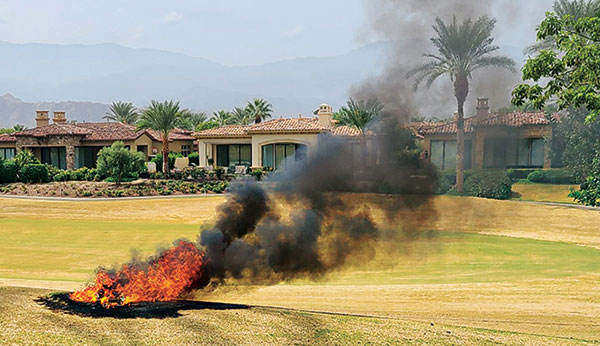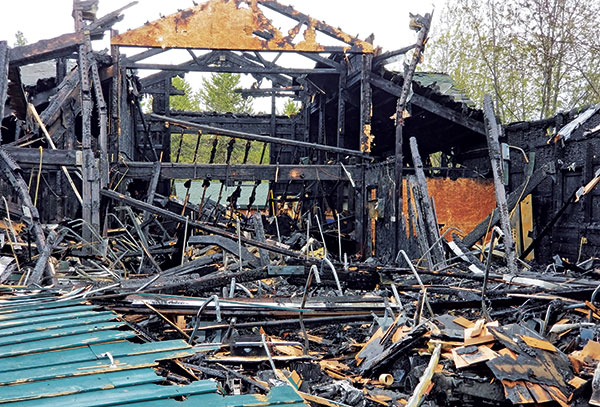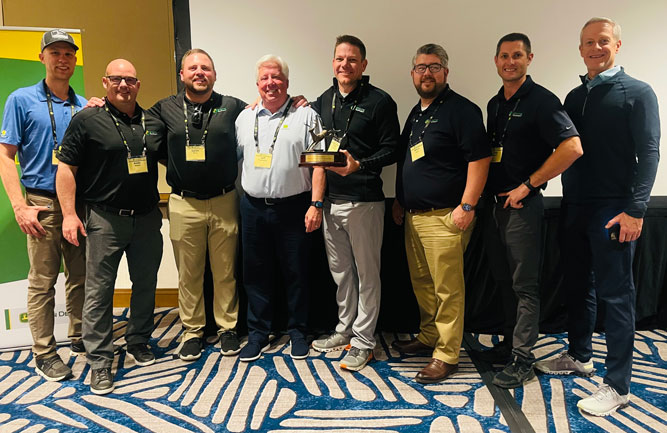Superintendents share tales of bad days on the course

Only days away from starting their overseed, Toscana CC’s irrigation system went up in smoke after an electrical surge. (Photo: Jared Stanek)
We asked friends of the magazine to tell us about those days at work that stand out as particularly bad. Here’s what we heard.
A disturbing discovery
It was March of 2018 when Delaware-based Superintendent Joe Gulotti got a phone call he never expected.
“The general manager is on the other end, and she is freaking out,” recalls Gulotti. “She tells me there is a dead body behind No. 5 green.”
No. 5 green has a woody area between it that serves as a buffer between the green and No. 17 green and 18 tee. Gulotti and his mechanic jumped in the cart to investigate.
“Sure enough, there’s a dead body,” Gulotti says. “And for some reason, his pants are down.”
Gulotti yelled at the person, while his mechanic trekked into the woody area to check for a pulse, but it was clear that the person was dead. Gulotti called 911 and as the sirens approached, he thought he was about to be on an episode of Law & Order. Turns out, they were asked a few questions, the area was taped off, the body removed and no one ever heard much about it again. No foul play was suspected. Once they learned the identity of the body, Gulotti realized he had met the deceased before.
“A few months earlier, this guy was walking across the golf course. I said, ‘you can’t walk out here, it’s dangerous, and it’s a golf course,’” Gulotti says. “He told me it was OK because his parents were members. I could tell something was off about him, so I mentioned it the next time I was in the pro shop. Someone told me, ‘oh yeah, that guy is the worst
alcoholic.’ Apparently, he would cut through the golf course as a shortcut to the liquor store.”
Though tragic, Gulotti says life moved on pretty quickly on the back of No. 5 green.
“I thought it would mess with me more than it did,” Gulotti says. “It really didn’t surprise me that this is how he ended up, unfortunately.”
Hurricane Andrew
Joe Pantaleo, a longtime superintendent in Florida, thinks back to August of 1992 for one of his worst days.
“I was working in Fort Lauderdale, and I had a house on the property,” he says. “The most horrific experience was just going outside and looking around that morning.”
Hurricane Andrew, a Category 5 storm that killed 65, destroyed 63,000 homes and committed $26.5 billion in property damage, had hit Florida’s east coast at about 1 a.m.
“Florida courses have big trees, and they were down everywhere. You couldn’t see any holes,” Pantaleo says. “That was my first experience with that whole ‘How do you eat an elephant’ question. You just have to start on one end and start working.”
It took more than 90 days to get the course cleaned up.
“When you live on the property, you’re like a farmer,” he says. “You have a sense of ownership over the course. This is your home, so you treat it more seriously than you might if you lived somewhere else and had to worry about your own house.”
An elemental force
For Jared Stanek, superintendent at Toscana CC in Indian Wells, Calif., his last really bad day wasn’t even a month old.
“It was three weeks ago. I’m getting ready for overseeding, this is our most important time of the year,” he says. “My assistant calls and says he has a few controllers that aren’t responding. The night before we had a lightning storm come through. All three of these controllers had the lightning arrestors melted. I said OK, we had a lightning strike right here. Let’s fix these.”
Stanek and his electrician, standing at a control box on No. 18, thought they had the problem solved, so they powered the system back up. The breaker tripped, and they knew there was still an issue, but immediately Stanek’s phone rang. The pro shop informed him there was a fire on No. 2.
“It’s on a different breaker altogether,” Stanek recalls. “As I’m driving out, I see a black cloud. As soon as I make the turn, I felt the heat. The controller is ash by the time I get there.”
An electrical surge went from a splice in the ground and melted 33 lightning arrestors and sent one box up into flames. The entire system was suddenly down, and in two weeks, he was scheduled to overseed.
“It was insane. It happened so quick,” Stanek says. “I asked my electrician, why didn’t the breaker trip? He got philosophical about it. He said look, we have all these safeguards in place, but it’s also humans trying to control a fundamental elemental force. We are wielding this force, and sometimes it behaves in ways you don’t think it will because it’s literally a force of nature.”
Thankfully, a few days later, the system was operational again. They progressed carefully, and the overseed schedule was maintained.
“It reminded me, you show up to work on a Saturday morning and things look so good,” Stanek says, “And then boom, you’re done.”

Rick Mooney took a phone call during a company retreat to discover Shore Lodge | Whitetail Club’s cart barn was on fire. (Photo: Rick Mooney)
A buzzkill
It was May of 2018 when Rick Mooney, vice president of maintenance and development at Shore Lodge | Whitetail Club in McCall, Idaho, found himself in a nightmare situation. The ownership group of the resort was in McCall from Boise — a two-plus-hour drive — for a company retreat. Mooney had to make a quick exit because of a phone call reporting smoke coming from the cart barn.
“When I got there, it was just black smoke billowing out,” Mooney recalls. “Within minutes, the flames burst through the roof, and it wasn’t long before the building was burnt all the way to the ground.”
It was 10 days before the course was to open, and all the carts, as well as the members’ clubs, had been destroyed. Mooney headed back to the retreat, which had now entered the cocktail hour phase, with the bad news.
“I didn’t tell anybody what was going on when I left,” Mooney recalls. “Then I walk back in, and I tell the president and the owner that we just suffered a total loss. They look at me and said, ‘Aww, that’s bull!’ I said, ‘not this time.’”
Mooney says his team scrambled to get things ready so the opening of the golf season wasn’t a disaster, but it took two years to get the right replacement for the cart barn. Meanwhile, insurance replaced the clubs of members who lost their clubs to the fire.
“I can only speculate that some of them may have embellished what clubs they actually had in their bags,” Mooney laughs.
The COVID crew
A superintendent at a high-end private club says it was in those first weeks of the pandemic that he recalled having one of those days. The pandemic forced the club to make the decision to send all the staff home, with pay. Meanwhile, the golf course still needed attention. The superintendent and his wife started to mow the areas most in need.
When a member found out about this, she volunteered her own time and some of her fellow members, to operate mowers.
“The first round went remarkably well,” the superintendent recalls. “We trained them briefly, and they got it done.”
As word spread, more volunteers came out of the woodwork. Though the superintendent wasn’t the organizer of the cause, one day, he got a call from one of his more affluent members.
“This guy is an investment banker, and he tells me he operates a tractor on his property,” the superintendent recalls. “He says because he can operate a tractor, he’s the right guy for the job and wants to come help. I says, ‘fine, come out and we’ll put you on a mower.’”
When the banker arrived, the superintendent quickly learned that this was free labor he did not want.
“This guy has no clue where to mow and where not to mow,” he says. “Or, he thinks he’s mowing, but he hasn’t figured out that his reels aren’t down.”
It was at this moment that the superintendent reached his breaking point and began shouting at the banker to shut down his mower, but the banker didn’t see or hear him and cruised right on by. The member who started the volunteer group saw the superintendent visibly angry, so she came over to try to settle things down. She says she knew this all must be very hard and asked when the regular crew would be coming back.
“I says tomorrow,” the superintendent says. “Because if this guy comes out one more time, it won’t be COVID that kills me, it’ll be watching this guy mow.”
What’s your “one of those days” story? Email us: sjones@northcoastmedia.net, or tweet us @Golfdom with the hashtag #1ofthosedays.












